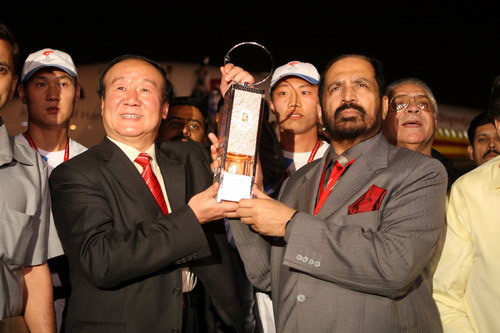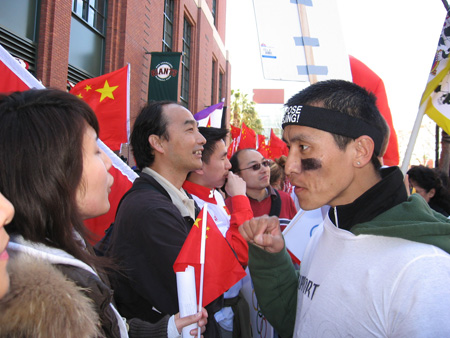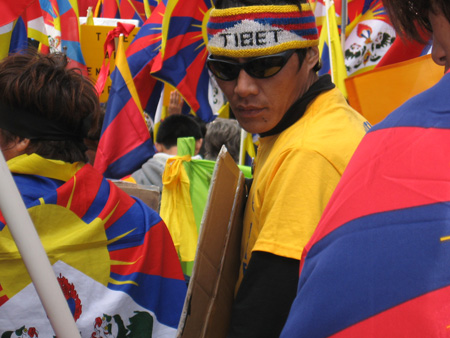4/18/2008
Trouble-plagued Olympic flame aims for the top of Everest, far from the maddened crowd

Mount Everest.
 China says terror plot foiled
China says terror plot foiled
Video Alleged terrorist plot to kidnap Olympic athletes and carry out suicide bomb attacks.
MOUNT Everest is blasted by fierce winds that can reach 280 km/h, filled with tiny chips of ice that trail behind its peak in a distinctive plume.
Early next month, Chinese mountaineers will carry the Olympic torch to the top of the snow-encrusted Himalayan mountain as part of its 97-day domestic odyssey.
But unlike recent torch relays in London, Paris and San Francisco, no one will be there to see it, or protest about it because access to the world's highest peak has been barred.
For the first time, the Nepalese Government has banned climbers from its side of Everest between May 1 and 10 while the torch makes its ascent.
It has also banned climbers from carrying material, including banners and pamphlets, that may harm the relationship between Nepal and China.
Everest permits issued to mountaineers state that teams must lock up their electronic equipment at the mountain's base camp and rely on government equipment until May 10, when the flame has returned from the summit.
In addition, mountaineers must allow "liaison officers" to search and seize anything they consider suspicious.
China has already announced it will block access to the Tibetan side of the mountain until May 10.
Greg Mortimer, who climbed Everest with Tim McCartney-Snape, becoming the first Australians to conquer it, said the new rules were a deliberate attempt to clamp down on dissent that could mar the Games.
"It shows there is serious concern on behalf of the Chinese and it's not surprising that Nepal would want to respond," Mortimer said. "They're sandwiched between two of the biggest populations in the world."
He said climbers should have the right to express their feelings on Tibet, but do so without offending the Nepalese.
"The top of Everest is a very, very big podium and they can express their views on Tibet in the media when they come home or before they leave," he said.
Mortimer, a member of the Australian Tibetan Council since the early 1980s, said
the controls would force climbers to be "creative" in how they expressed their views.
The restrictions on climbers' communications equipment have prompted concerns about safety, an issue close to the heart of Australian mountaineer Lincoln Hall.
Hall made headlines around the world in 2006 when he was left for dead on Everest after suffering from debilitating altitude sickness. Twelve hours later he was found alive at 8700 metres, sitting crosslegged with his down suit unzipped to the waist, wearing no hat, gloves or sleeping bagBeijing Olympic flame reaches India
The Beijing Olympic flame arrived in New Delhi in the early morning of Thursday on the second leg of its relay in Asia as it makes its way to Beijing.

Jiang Xiaoyu (left), vice president of the Beijing Organizing Committee of Olympic Games holds the flame lantern. (Photo: BOCOG)
The Olympic flame, carried in a specially-designed lantern on a chartered plane, was flied to New Delhi from Islamabad, Pakistan.
Upon arrival, the Olympic flame and the whole delegation were welcomed by a cheering crowd, among whom are President of India Olympic Committee Kalmandi and Chinese Ambassador to India Zhang Yan.
The flame delegation is headed by Jiang Xiaoyu, vice president of the Beijing Organizing Committee of Olympic Games, who carried the flame lantern. A Indian girl offered a bunch of flowers to Jiang.
The Olympic torch relay, the first time for New Delhi, will start Thursday afternoon along three-kilometer-long Raji Path between the Indian Gate and the Indian Presidential Palace. 70 torch bearers will take part in the relay.

Indian ace tennis star Leander Paes speaks during a press conference on Beijing Olympic torch relay in New Delhi, India, April 16, 2008.



(Xinhua News Agency April 17, 2008)
Drawn to the Olympic Flame: A View from the Ground
The Scene: Wednesday, April 9th, Justin Herman Plaza, San Francisco... the gathering place for all torch protesters, torch supporters and torch rubber neckers.
The buzz: it was all about being a part of the pageantry that is largely what the Olympics are all about. A little bit of light from the birthplace of the games that was coming to us. One that will inevitably spark strong feelings of nationalism for some, and anger for others. San Francisco, a city that honors free speech, will be the place to safely air strong feelings about what the torch and the games mean. Or so the thinking went.
10 AM
The crowds gather in anticipation of glimpsing the torch along the originally scheduled route. The first thing that you notice is that besides the expected groups of protesters concerned with China's brutal policies and actions in Tibet, Burma, Sudan and China itself, there are huge expanses of red that upon further inspection were made up entirely of Chinese flags held aloft by thousands of pro China supporters in red sweatshirts and jackets. I was suddenly reminded of the ugly history of the Olympic torch relay. It was devised by Nazi Germany in 1936 for the purposes of propaganda and glorifying the Aryan race. That focus on pageantry goes a long way to explaining why the Chinese government itself had arranged for bus loads of China supporters to be present that day.
The ones I spoke with said they were there primarily to show support for the Olympics taking place in their homeland. This common ground gave me hope. Everyone was there to celebrate what is good about the Olympics. However, I doubt the Chinese government organizers foresaw that the bussed-in fans of the Olympics in Beijing would have very little to say in defense of the Chinese policies that the rest were there to protest. All day I recorded conversations that these China supporters had with the various protesters and many of them clearly had very little grasp of the history of the Chinese invasion of Tibet, the impact of China's policies in Sudan and other issues that formed the crux of the protests. At least on a very individual level, the Chinese failed on the propaganda front in terms of the few Chinese people I saw firsthand begin to ask questions, and then to acknowledge that the situation in Tibet is indeed problematic, or that China's implicit support for genocide in Sudan needs to be addressed. In one case, I witnessed a red clad China supporter reach across to hug a man draped in a Tibetan flag and call him brother. Brotherhood, common ground -- could it be that the Olympic ideal was being honored, almost in spite of itself?

12 PM
The crowds spread out along the Embarcadero, the last known intended location for the torch run. As thousands waited, tensions mounted. That's where those images of angry protesters yelling in each others' faces come from. These images constituted the primary meal fed to the global media beast that day. It was apparent to me that aggressive verbal instigation was coming from all sides. The heated ad hominem debates I witnessed were pretty scary as they escalated to the brink of harassment and assault. Sticking a bullhorn in someone's ear and then shouting slogans, spitting on someone or throwing water at them -- I saw this come from all sides and eerily the perpetrators were almost always grinning. The fact that the media was everywhere standing by ready to document an outbreak or some other visualization of the clash of opinions certainly added to the heated atmosphere. I saw a laughing Chinese man throw pennies at Tibet supporters, and another shout through a bullhorn that all Tibetans are "losers." This powerful political statement had the unintended consequence of making him out to be a pretty weak pro-China advocate. In fact, most China supporters stuck to chanting "One China" which, actually proved to be another excellent starting point for shared dialogue. Tibet supporters replied that they want one China too, they just don't want to be a part of it. Of all the images I will remember from that day it's not the screaming crowds but the activists who were brave enough to repeatedly link arms and create a human barrier, effectively restraining their clearly provoked anti-China colleagues. "No violence, remember?" and "Peace, we're all brothers" were mixed in with the chants of "Free Tibet" and "One China". Any act of violence, regardless of who was responsible for sparking it would have played into China's excuse to suppress all demonstrations and to validate their pressuring the city to take such drastic measures to ensure that the all important face of the event remained intact.

1 PM -- Whither the torch?
The torch relay itself of course turned into a sort of hide and seek that on a macro level is highly symbolic of China's increasingly desperate attempts to cover up the gaping chasm between what is shown to the world and how things really are in China. The spotlight of the Olympics is not only highlighting the glories of a modern China but also showing the ugly underside, repressive policies and a population far from united in supporting the government. Despite another three hours of following rumored leads, chasing a decoy bus, and in my case covering a good 10 miles on foot back and forth along the Embarcadero, very few of us actually saw the torch until we went home to watch it on TV.
4 PM
Everyones claims victory that afternoon. The Tibetans and other anti-China groups had achieved the goal of disrupting the torch route and of aborting the closing ceremony and they managed to do all this in a non-violent manner, as the Dalai Lama had specifically requested in an message he issued earlier in the week. Word came that one of the runners had pulled out a Tibetan flag during his leg, and another was able to flash a Free Tibet sign.
The city was happy to have had no major incidents. Technically it had pulled off a relay of sorts, even if it meant hiding the torch in a warehouse, bussing it from location to location, using a decoy torch and ultimately disappointing thousands who had turned out for a glimpse of the real thing.
China was happy too. The waves of red flags played well on TV and ultimately the torch relay, despite being abbreviated, was completed.
But in a day full of unintended consequences here's the one that I hold to be the true victory. It's the camaraderie I witnessed when individuals -- whether they were carrying Chinese flags, Tibetan flags, Save Darfur or Free Burma signs -- were all united in their goal to try and find the torch. On the ground level we were all forced to communicate and create a bond, with a common mission, however ironic that may be. And rather than the Olympic torch, that hug that I witnessed between two men who were able to acknowledge their common humanity all the while debating the politics of the Olympics is to me the true symbol of what was achieved that day.



















